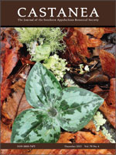
CASTANEA
Scope & Guideline
Celebrating the Legacy of Plant Science Research Since 1982
Introduction
Aims and Scopes
- Plant Taxonomy and Systematics:
The journal frequently publishes articles that focus on the classification, identification, and taxonomic revisions of plant species, including both native and invasive species. - Ecological Studies and Conservation Biology:
Research emphasizing ecological relationships, community dynamics, and conservation strategies for imperiled and endemic species is a core focus, reflecting the journal's commitment to biodiversity preservation. - Plant Physiology and Genetics:
Studies exploring the physiological responses of plants to environmental changes, as well as genetic diversity and population structure, are prevalent, contributing valuable insights into plant adaptation and resilience. - Impact of Invasive Species:
Research addressing the effects of non-native species on local ecosystems, including community composition and plant interactions, is consistently featured, highlighting the importance of invasive species management. - Field Surveys and Floristic Documentation:
The journal includes numerous floristic surveys and biodiversity assessments, documenting plant species occurrences and distributions across various regions, which are crucial for local conservation efforts. - Interdisciplinary Approaches:
CASTANEA encourages interdisciplinary research that integrates various scientific methods, including morphological, ecological, and genetic analyses, to enhance understanding of plant systems.
Trending and Emerging
- Climate Change Impact Studies:
There is an increasing focus on how climate change affects plant species distributions, conservation strategies, and ecological dynamics, underscoring the urgency of addressing climate-related issues. - Community Science and Citizen Involvement:
Research involving community science initiatives and citizen participation in botanical studies is gaining traction, reflecting a trend towards collaborative and inclusive scientific approaches. - Genomic and Molecular Approaches:
Emerging studies incorporating population genomics and molecular techniques to assess genetic diversity and conservation genetics are becoming more prominent, indicating a shift towards modern methodologies. - Restoration Ecology:
An increased emphasis on restoration ecology, particularly in the context of invasive species management and habitat recovery, reflects growing concerns about ecosystem health and resilience. - Urban Ecology and Green Spaces:
Research focused on plant communities in urban settings and the role of green spaces in biodiversity conservation is trending, showcasing an interest in the intersection of urban development and ecological sustainability.
Declining or Waning
- Historical Botanical Studies:
There has been a noticeable reduction in papers focusing solely on historical botanical accounts or botanical history, suggesting a shift towards more contemporary ecological and conservation issues. - Morphological Studies in Isolation:
Although morphology remains important, the emphasis on standalone morphological studies without integration into broader ecological or genetic contexts appears to be waning. - Traditional Herbarium Studies:
Research primarily based on herbarium specimens with limited fieldwork or ecological context is less frequently published, indicating a move towards more dynamic and field-based studies.
Similar Journals

NEW ZEALAND JOURNAL OF BOTANY
Fostering Innovation in Plant Science ResearchThe New Zealand Journal of Botany, published by the esteemed Taylor & Francis Ltd, serves as a pivotal platform for disseminating significant research in the fields of Ecology, Evolution, Behavior and Systematics, as well as Plant Science. With a rich history dating back to 1963 and an impressive convergence extending to 2024, this journal has established itself as an essential resource for researchers and professionals dedicated to understanding the complexities of plant life and ecological systems in New Zealand and beyond. The journal is currently categorized in the Q3 quartile for both relevant disciplines as of 2023, reflecting its balanced influence within the global academic community. Although not an open access journal, it retains a significant impact factor, evidenced by its Scopus rankings, which place it within the top half of its categories. This makes it an invaluable tool for students, researchers, and academics aiming to engage with robust, peer-reviewed scientific findings and contribute to the evolving discourse surrounding botany and ecological research.

Botany
Exploring the depths of ecology and evolution.Botany is a premier academic journal published by Canadian Science Publishing, dedicated to advancing the understanding of plant sciences and ecological systems. With an ISSN of 1916-2790 and an E-ISSN of 1916-2804, this journal has established itself as a respected publication in the fields of Ecology, Evolution, Behavior and Systematics, and Plant Science, reflected in its 2023 Q2 and Q3 rankings. Covering a wide range of topics, Botany is committed to fostering interdisciplinary research, promoting innovative methodologies, and disseminating significant findings from both theoretical and applied perspectives. Based in Ottawa, Canada, the journal is open access, ensuring that high-quality research is accessible to a global audience, thereby playing a crucial role in the dissemination of knowledge in the scientific community. With convergence years from 2008 to 2024, it continues to evolve alongside the scientific advancements in botanical studies, making it an essential resource for researchers, professionals, and students alike.
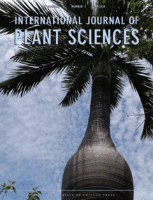
INTERNATIONAL JOURNAL OF PLANT SCIENCES
Cultivating excellence in plant research and publication.The INTERNATIONAL JOURNAL OF PLANT SCIENCES, published by UNIV CHICAGO PRESS, is a leading journal dedicated to advancing knowledge in the fields of plant sciences and ecology. With an ISSN of 1058-5893 and an E-ISSN of 1537-5315, this journal has been a prominent platform for groundbreaking research since its establishment, featuring works from 1983 to present. It holds an impressive Q2 ranking in both Ecology, Evolution, Behavior and Systematics and Plant Science, reflecting its reputable standing within the academic community. The journal is well-regarded for its rigorous peer-review process and commitment to high-quality publication standards, making it a favored choice for researchers, students, and professionals eager to engage with the latest findings and innovative methodologies in plant research. While it does not currently operate under an Open Access model, the journal provides ample access options for institutions and individuals keen to explore its curated content. By presenting diverse studies that blend theoretical and practical insights, the INTERNATIONAL JOURNAL OF PLANT SCIENCES plays a critical role in fostering interdisciplinary dialogue and advancing the frontiers of plant science research.
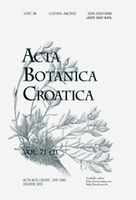
ACTA BOTANICA CROATICA
Elevating Ecological Insights for a Greener FutureACTA BOTANICA CROATICA is an esteemed interdisciplinary journal dedicated to the exploration and advancement of botanical sciences, published by UNIV ZAGREB, FAC SCIENCE, DIV BIOLOGY. Since its inception, this journal has embraced an Open Access model, enabling researchers and the global scientific community easy and unrestricted access to cutting-edge findings in plant biology, ecology, and evolutionary studies since 2011. Covering a broad spectrum from plant science to ecological and evolutionary behavior, ACTA BOTANICA CROATICA holds an important position in the academic landscape, currently classified in the Q3 quartile for both Ecology, Evolution, Behavior and Systematics and Plant Science categories. With a robust ranking in Scopus, it stands at #246 out of 516 in Plant Science and #360 out of 721 in Ecology, showcasing its commitment to quality research dissemination. The journal invites contributions from researchers, professionals, and students aiming to broaden the horizons of botanical research and foster collaboration within the scientific community.
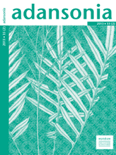
ADANSONIA
Pioneering discoveries in plant science since 2000.ADANSONIA is a distinguished, peer-reviewed open access journal dedicated to advancing the field of plant science. Published by the Publications Scientifiques du Museum in Paris since 2000, this journal serves as a critical platform for sharing innovative research and discoveries in botany, ecology, and related disciplines. With its ISSN 1280-8571 and E-ISSN 1639-4798, ADANSONIA boasts a notable Scopus rank of #383 in the Agricultural and Biological Sciences category and a 2023 category quartile ranking of Q3 in Plant Science, indicating a meaningful contribution to the academic community. The journal's scope encompasses a broad range of topics, making it a vital resource for researchers, professionals, and students alike who are exploring the complexities of plant biology. Based in France, ADANSONIA not only enhances visibility for groundbreaking research but also facilitates open communication amongst scholars, ensuring that knowledge on plant science is accessible worldwide. Located at CP 39-57, Rue Cuvier, F-75231 Paris Cedex 05, France, this journal stands as a testament to the collaborative efforts in the pursuit of scientific excellence in plant sciences.
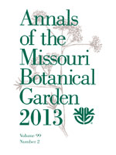
ANNALS OF THE MISSOURI BOTANICAL GARDEN
Connecting Scholars to the Wonders of Plant ScienceANNALS OF THE MISSOURI BOTANICAL GARDEN is a prestigious, peer-reviewed journal published by the Missouri Botanical Garden, focusing on the rich disciplines of Ecology, Evolution, Behavior, and Plant Science. With a storied history dating back to 1946, this journal has evolved to become a significant platform for scholars and professionals to disseminate research that informs global understanding of plant biology and conservation. Ranked in the Q2 category for both Ecology and Plant Science in 2023, it boasts commendable standings within the Scopus rankings, placing it in the 66th percentile for Plant Science and the 65th percentile for Ecology, Evolution, Behavior, and Systematics. The journal's commitment to rigorous scientific standards ensures that it remains a vital resource for those seeking to explore vital ecological and botanical research. As a product of the esteemed Missouri Botanical Garden, the journal serves researchers, professionals, and students alike, encouraging collaboration and innovation in the plant sciences community.

Boletin de la Sociedad Argentina de Botanica
Fostering innovation in plant biology and ecological studies.Boletin de la Sociedad Argentina de Botanica is a prestigious open-access journal dedicated to advancing the field of botany, with a specific focus on plant science and ecological study. Published by the SOC ARGENTINA BOTANICA since 2005 and based in Argentina, this journal is committed to providing a platform for high-quality research that contributes to the understanding of plant biology, evolution, and ecological interactions. With an ISSN of 1851-2372, it features research articles that are accessible to a global audience, thus promoting collaboration and knowledge sharing among scientists, researchers, students, and the broader academic community. Despite being categorized in the fourth quartile for both Ecology, Evolution, Behavior and Systematics and Plant Science as of 2023, the journal serves as an important resource within its niche, offering insights from the Latin American context. Researchers and professionals are encouraged to utilize this journal as a valuable reference in their studies and contributions to the ongoing discourse in botanical science.
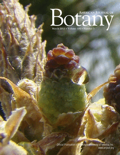
AMERICAN JOURNAL OF BOTANY
Exploring the Wonders of Botany and BeyondAmerican Journal of Botany, an esteemed publication by Wiley, serves as a pivotal platform for the dissemination of groundbreaking research in the fields of botany, ecology, plant science, and genetics. With an illustrious history dating back to 1946, this journal holds a prestigious position in the academic community, evident through its Q1 ranking in both Ecology, Evolution, Behavior and Systematics and Plant Science, alongside a Q2 ranking in Genetics as of 2023. The journal maintains a competitive edge, ranked 159th in Ecology and Evolution and 124th in Plant Science according to Scopus metrics, underscoring its impact within the research landscape. Though traditionally not an open-access journal, it continues to provide valuable insights and advancements in botanical science, making it essential reading for researchers, professionals, and students dedicated to understanding and exploring the complexities of plant life. The journal's commitment to high-quality research ensures that it remains a cornerstone in the pursuit of knowledge in botany and related disciplines.
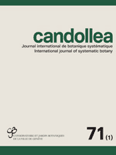
CANDOLLEA
Unlocking the Secrets of Ecosystems and Evolution.CANDOLLEA is a distinguished academic journal published by the Conservatoire et Jardin Botaniques Ville Genève, focusing on the fields of Ecology, Evolution, Behavior, Systematics, and Plant Science. With an ISSN of 0373-2967, this journal serves as a vital platform for researchers, professionals, and students aiming to deepen their understanding and contribute to the scientific discourse surrounding botanical research and ecosystem dynamics. Since its convergence in 2000, CANDOLLEA has trodden the path of scholarly excellence, currently residing in the Q3 quartile for both Ecology and Plant Science in 2023. Although it does not currently offer open access, the journal plays a critical role in disseminating valuable findings and innovative methodologies that shape contemporary ecological and botanical studies. The journal is located in Switzerland at CASE POSTALE 60, CH-1292 CHAMBESY, serving as a beacon for scholars dedicated to advancing their expertise in environmental and plant sciences.

Annali di Botanica
Unlocking the secrets of plants for a sustainable future.Annali di Botanica is a distinguished journal published by UNIV STUDI ROMA LA SAPIENZA that has become a vital platform for advancing research in the field of plant sciences. With its Open Access policy established since 1995, it ensures that a wide audience including researchers, professionals, and students can access high-quality, peer-reviewed articles that contribute to the global body of botanical knowledge. As of 2023, the journal holds a Q3 rank in the Plant Science category, reflecting its commitment to scholarly excellence and relevance, as evidenced by its position within the 62nd percentile of activities ranked in Scopus. The journal encompasses diverse topics in botany, fostering discussions that encompass morphological, ecological, and genetic aspects of plants, effectively bridging theoretical knowledge and practical applications. Situated in the heart of Rome, Italy, at PIAZZALE ALDO MORO, 5, the journal not only addresses regional botanical issues but aims to serve a global audience, enhancing collaborative efforts and stimulating innovation across the botanical sciences.